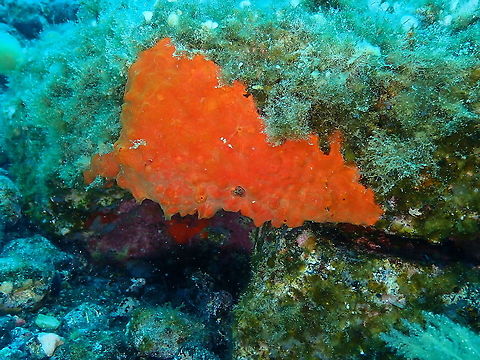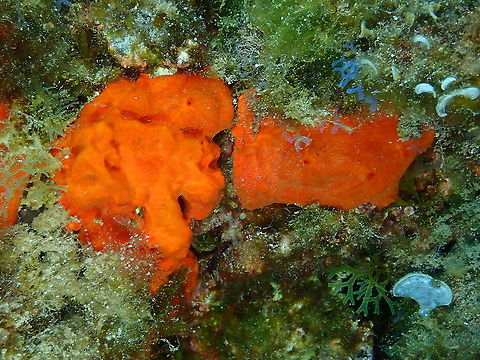
Appearance
Colour: Deep yellow to light orange (Mediterranean records mention carmine red colour).Shape, size surface and consistency: According to the original description, it is thinly encrusting, smooth and soft. No other particulars are known.
Spicules: Strongyles only. They measure 170-200 by 2-3 µm (n=25) (a slide made from the type was studied), they are isodiametric, in general equally shaped at both apices, but a few may be found with one end somewhat mucronate. There is very little variation in length and thickness and all belong obviously to a single category. Most have a wide axial canal.
Skeleton: It has a very simple skeleton of thin strongyles arranged in ill-defined plumose bundles. The spicule bundles in the microscopic slide of the type are vague, not visibly bound by spongin, and they follow a wispy course. There are no obvious bouquets at the surface (but these were reported by Topsent), and an ectosomal cover of spicules is not apparent.
Its larvae have been described as big, yellow and having a bare posterior pole.

Naming
Etymology: inops (Latin) = weak, referring to the consistency.This species, was originally described as Halichondria inops (Topsent, 1891). It is the type of the genus Batzella (Topsent, 1894).
Distribution
Northeast Atlantic.Habitat
Occurring rather commonly under stones in the mid-littoral.Reproduction
Hermaphroditic. Life cycle: The zygote develops into parenchymella larva (free-swimming) before settling down on a substrate where it grows into a young sponge. Reproduction: August-September. Its larvae have been described as big, yellow and having a bare posterior pole (Topsent, 1894), which is characteristic of Poecilosclerida.References:
Some text fragments are auto parsed from Wikipedia.
https://www.sealifebase.ca/summary/Batzella-inops.htmlhttp://species-identification.org/species.php?species_group=sponges&id=144
http://landive.es/nueva%20landive/atlas/tunicados.htm
http://www.marinespecies.org/porifera/porifera.php?p=taxdetails&id=168736
https://www.davyjonesdiving.com/marine-life/displayimage.php?pid=152
Taxonomy of Porifera: From the N.E. Atlantic and Mediterranean Sea edited by Jean Vacelet, Nicole Boury-Esnault